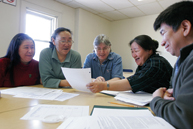Inuit bring northern warmth to School of Social Work
Inuit bring northern warmth to School of Social Work McGill University
User Tools (skip):
Inuit bring northern warmth to School of Social Work

Left to Right: Lydia Annahatak from Kuujjuaq, Elisapie Uqittuq Kangiqsujuaq from Kangiqsujuaq, McGill professor Trudy Blumstein, Maggie Okituk from Salluit, and Sarollie Inukpuk from Inukjuak.
Owen Egan
In previous years, McGill School of Social Work instructors have flown north to train recently hired Inuit community workers. This year, tight timelines and an even tighter budget made it necessary for program coordinator Laura Mastronardi to bring the four most advanced students to McGill in March for an intensive nine-day program.
Huddled around tables pulled into a circle in the upper reaches of Wilson Hall, the students from Kuujjuaq, Inukjuak, Salluit, and Kangiqsujuaq, race to complete their Certificate in Northern Social Work Practice before the current funding agreement with Quebec's Ministry of Education expires in May. Chances are good the ministry will continue to fund the program but the terms of that agreement remain to be determined.
"Each province offers some form of social work training designed for aboriginal needs," says Mastronardi. "McGill's program is unique in that course instruction and resources are delivered in the students' first language, Inuttitut." The curriculum, modelled on McGill's Bachelor of Social Work program, has been adapted to the resources available in isolated communities and to the students' learning style. "These are adult learners," Mastronardi stresses. "Some were born on the land, in igloos or tents, at a time when Inuit were still nomadic. They may not have been able to take advantage of formal education."
Classroom discussion is a lively mixture of English and Inuttitut. Says Blumstein, "It takes time to arrive at consensus about how best to express English-language terms like 'marital dysfunction' in their own language. But once they have the words, it's a sign they've really understood the idea."
While the opportunity to study on campus offers what Sarollie Inukpuk calls a "window to see other social workers and professionals," the students have been struck by the lack of human contact on the city's busy streets. The simple gesture of reaching out to shake a stranger's hand, a social norm in Inuit communities, is so rare in Montreal that Elisapie Uqittuq finally decided to break the ice herself and greet a passerby. She laughs wryly at the memory. "There was no response. They were probably thinking, what's wrong with her?"
Getting away for nine days can be a challenge. For Maggie Okituk, it not only means getting someone to cover at work, she also has to arrange care for the 10 members of her extended family, including two infant grandchildren, who share her house. But Lydia Annahatak, who works at the CLSC in Kuujjuaq, knows it's worth the effort. "The program gives me better knowledge of social needs so I am more able to help my people," she says.
Since 1982, a total of 32 students have completed the program. Many others have benefited from the program to acquire skills they now use as nurses, teachers, and in roles with the Regional Council. In the remote hamlets of the north, said instructor Trudy Blumstein, "Often our students are the only game in town."
The trip to Montreal allows students a much-needed chance to unwind by indulging in a favourite pastime, shopping. Mastronardi and Blumstein approve of this "restorative therapy" with a grin and their favourite Inuttitut word "kulaluk," slang for "cool."

